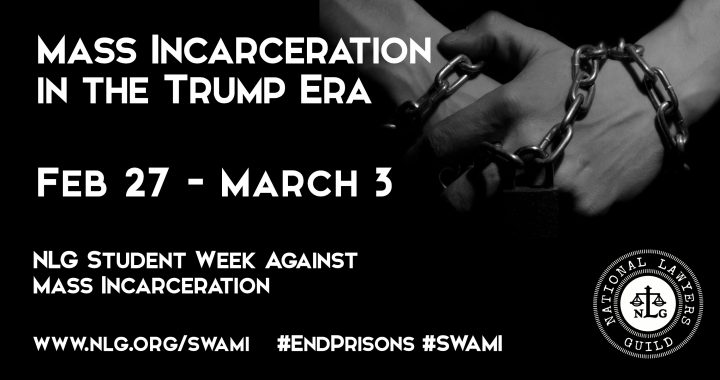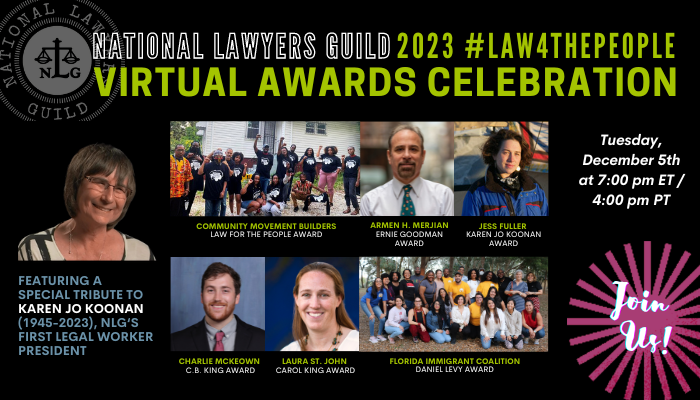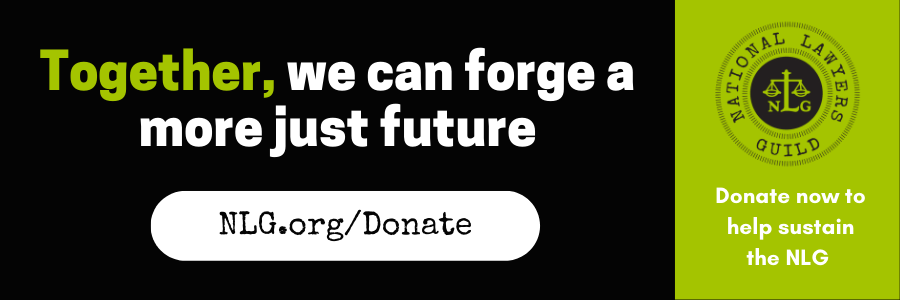By Pooja Gehi, NLG Executive Director
In 2015, the National Lawyers Guild adopted a resolution calling for the dismantling and abolition of all prisons. As an organization, we recognized mass incarceration in all of its iterations—policing, violence, incarceration, forced labor, privatization and capitalism—as a crisis that we must resist in all of our work. Sharlyn Grace, then NLG Co-executive Vice President explained: “Calling for the abolition of this profit-motivated system that is designed to maintain racial and economic inequality while relying on individualized punishment as a primary response to social problems falls directly within our mission of protecting human rights over property interests.”
In the resolution, we commit to supporting grassroots organizing efforts, policy initiatives, and litigation that promotes or moves toward abolition, including the rights and organizing of prisoners, the de-funding and closure of prisons, redirection of prison and policing budgets into social services and re-entry support, legalization of drug use and sex work, release of prisoners serving life without parole and other inhumane sentences, decreased use of solitary confinement, and efforts to prevent construction of new prisons.
Over the past two years, we deepened this commitment by centering our jailhouse lawyer members, providing legal support to the National Prison Strike, organizing actions and events at law schools to call for an end to mass incarceration, and building with allied organizations such as Critical Resistance and Black and Pink to consider and address the inherent contradictions involved in working within the legal system towards a world without prisons. During this time, the problem of mass incarceration in the United States became a mainstream conversation often directly tied to its history of slavery and colonization. Racist policing came to the fore with the Black Lives Matter Movement and President Obama finally called for an end to the use of private prisons. However, mass incarceration continues to be a critical point of struggle in which the NLG works to intervene in various ways.
One aspect of the NLG’s mass incarceration work on a national scale is our connection with “jailhouse lawyers”, which refers to prisoners who learn to advocate for themselves and assist other prisoners in legal matters relating to their sentence, to their conditions in prison, or to civil matters of a legal nature. This is evident through a few different facets. One is our Prison Law Project, which sends out Jailhouse Lawyer Handbooks to prisoners upon request. Another is the work of our Mass Incarceration Committee, which has a group of volunteers who respond to all letters we receive from jailhouse lawyer members ranging from basic legal research to providing case law that is otherwise inaccessible on the inside. We maintain a website and include the column “Beyond Bars” in Guild Notes to highlight the voices of our jailhouse lawyer members, through letters they send describing what it’s like to do legal work behind bars and all the obstacles incurred in the process. Finally, for the past two years, we have supported recently released jailhouse lawyer members through our Haywood Burns Fellowship Program.
We know that with every victory we have achieved over the decades, backlash can be expected. In 2017, we are facing an entirely different political landscape. Donald Trump was elected on a racist “law and order” campaign platform and immediately ordered a Muslim ban on entry to the United States, mandatory deportation for immigrants charged with minor quality of life offenses, the reinstatement of stop and frisk policing, and three executive orders protecting police officers. One of Attorney General Jeff Sessions’ first actions was repealing the Department of Justice’s private prisons memo, as well as threatening to rollback protections for trans and gender non-conforming prisoners.
These are certainly scary times to organize and advocate, yet simultaneously we have seen the power of our communities to come together to resist this administration through a multitude of different strategies. From the mass mobilizations to shut down airports and demand the release of folks being held after the immigration ban to the wave of prisoner strikes and riots to cities committing to continue to provide safety and support to trans and gender non-conforming students in their school districts, we can see that people are ready to fight and resist this administration at every turn.
Each year, the NLG holds National Student Week against Mass Incarceration (SWAMI) to encourage our student members to highlight and resist aspects of the prison industrial complex. This year we asked students to work with the theme, “Mass Incarceration in the Trump Era.” Through workshops, panels, movie screenings, tabling and other events, students connected the issue of mass incarceration to immigration policies, racial justice, gendered forms of violence, transformative justice and much more. This year, over 25 student chapters participated in SWAMI and helped to bring the current issues of mass incarceration to their law schools.
While we may feel fear, grief, anger and despair at the current conditions we are facing on our political landscape, now is the time for us to practice everyday abolition strategies as we continue to challenge the current fascist regime. This political moment is moving multiple movements into more conversation and strategic alignment, as we all face direct attack. The NLG has experienced a huge increase in donations and members since Trump was elected, demonstrating that there is still a broader commitment to social justice and finding solutions to ending mass incarceration.
The NLG is now in its 80th year. We have a wide, diverse membership base that has fought on the front lines for decades. Now is the time for us to support each other, to remember our shared history of resistance. Now is the time for us to continue to build on the strategies and lessons learned from our 80 years of collective organizing and advocacy. We are in this current political moment because we are winning, and the blow back is a response to the victories we have won for our most vulnerable and most impacted communities. NLG members have a wealth of knowledge and experience learned from participating in resistance movements. Folks should reach out to the lawyers who supported the Black Panthers and worked against COINTELPRO. Folks should connect with our international committee to learn about how movements have successfully resisted dictatorships and fascist regimes in other countries. Folks should engage with law students to learn about current context and youth movement and resistance. We are deeply grateful and humbled to be a part of an organization that provides critical legal support to the front lines of liberation movements.




